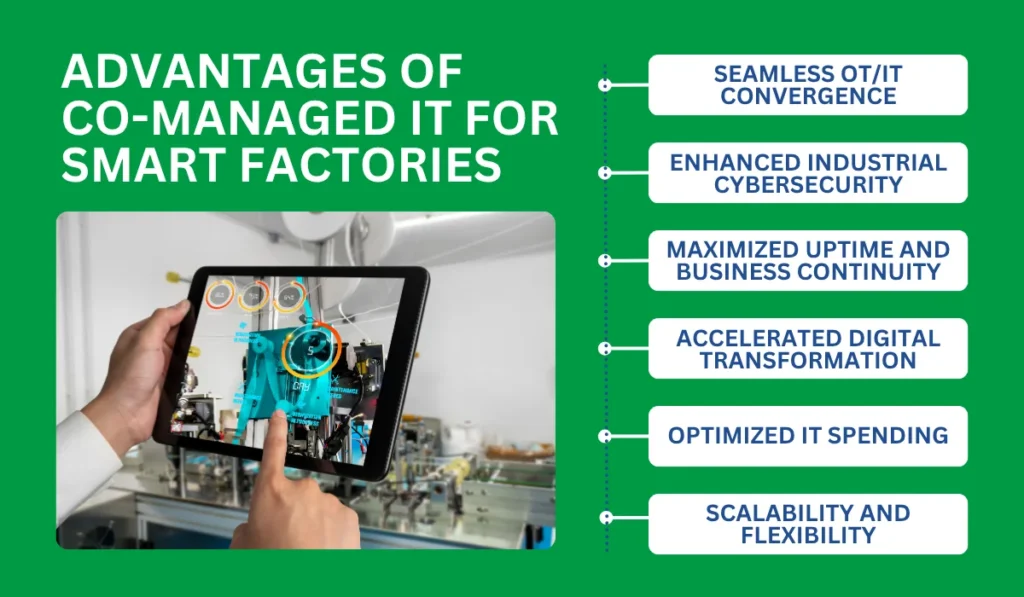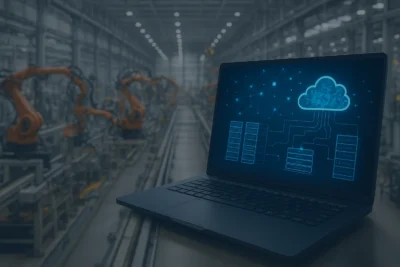Smart factories are evolving fast, and your IT infrastructure has to keep up. With AI, IoT, and automation driving daily operations, IT is no longer just a backend function; it’s central to productivity and innovation.
According to Deloitte’s 2025 Smart Manufacturing Survey, only 32.5% of manufacturers use third-party IT support, highlighting a significant gap between digital ambition and reality.
The result? Overwhelmed IT departments, rising day-to-day issues, and end users frustrated by delayed response times. For many manufacturers, the in-house IT team is spread too thin, managing legacy systems, handling Microsoft licensing, keeping up with Azure cloud migrations, and trying to support mission-critical platforms like enterprise resource planning (ERP) or manufacturing execution systems (MES). That’s where co-managed IT changes the game.
This collaborative model connects your internal IT staff with a specialized managed IT services provider (MSP), filling technical gaps, accelerating digital transformation, and ensuring IT solutions are aligned with your business needs. Whether it’s reducing downtime, improving cybersecurity, or streamlining IT management, co-managed IT gives manufacturers the agility, expertise, and resilience to stay competitive. Backed by case studies and proven results, this guide will show you how to elevate your IT operations and meet the evolving demands of today’s smart manufacturing ecosystem.
Key Takeaways
- Co-managed IT services give your internal team the backup they need to manage complex manufacturing systems confidently.
- You reduce downtime and cybersecurity risks by pairing in-house knowledge with expert external support.
- This model is ideal for smart factories, balancing legacy systems with digital transformation initiatives.
- Your IT department stays focused on business priorities while partners handle routine issues and 24/7 monitoring.
- Choosing the right co-managed IT provider sets your manufacturing business up for long-term efficiency, innovation, and resilience.
The Unique IT Demands of Modern Manufacturing
Smart factories are digital ecosystems, and the IT environment supporting them must be as advanced. Here’s why many manufacturing companies are struggling to keep up:
OT/IT Convergence
Modern factories must bridge operational technology (OT) systems, such as programmable logic controllers (PLCs), supervisory control and data acquisition (SCADA), and industrial control systems (ICS), with information technology (IT) systems like ERP, MES, and cloud services. These systems often operate on different protocols, security models, and upgrade cycles. Successful integration requires IT teams fluent in both domains, a rare combination.
24/7 Uptime
Downtime is the enemy of productivity. Even brief outages can stall production, delay shipments, and impact customer satisfaction. A robust, real-time IT infrastructure supports mission-critical tasks like robotics control, inventory tracking, and supply chain automation.
Specialized Software and Hardware
Manufacturers rely on various systems, including MES, ERP (SAP, Oracle), computer-aided design/computer-aided manufacturing (CAD/CAM) software, and IoT sensors, that all need to talk to each other. Managing this complex landscape requires more than basic IT support; it demands experience with deep system integration, workflow optimization, and scalable IT solutions that align with business needs.
Legacy Systems and Modernization
Many factories still depend on aging systems that lack compatibility with modern tools. But ripping and replacing isn’t always practical. Co-managed IT helps teams modernize strategically, balancing innovation with continuity so day-to-day operations stay intact while upgrades roll out.
Industrial Cybersecurity Risks
Manufacturing is now a top target for cyberattacks. Threats like ransomware or OT breaches can cause real-world damage from production halts to safety incidents. According to Kiteworks, vendor access breaches alone made up 42% of manufacturing cybersecurity incidents in 2025. Protecting your IT infrastructure and the people and processes it supports requires continuous monitoring and advanced cybersecurity protocols tailored to manufacturing.
Data Volume and Analytics
IoT and smart machines generate terabytes of data daily. Your IT department must manage real-time data pipelines for predictive maintenance, quality control, and operations optimization to extract actionable insights. That’s a tall order without the right tools and support.
What Is Co-Managed IT and Why Is It Built for Manufacturing?
Co-managed IT services involve a collaborative approach between your internal IT staff and an external managed IT services provider (MSP). Rather than replacing your in-house team, this model enhances its capabilities, pairing your institutional knowledge with a trusted IT partner’s resources, technologies, and specialized expertise.
Why It’s a Smart Fit for Manufacturing:
- Institutional Knowledge Stays In-House: Your team retains control over proprietary systems and workflows, while external experts support without disrupting day-to-day operations.
- Specialized Skill Augmentation: Fill critical gaps in areas like cybersecurity, data analytics, IT management, and cloud platforms such as Microsoft Azure.
- Scalable Support for Critical Tasks: Free up your team by offloading help desk tickets, patching, and routine maintenance.
- Always-On Availability: Benefit from 24/7 coverage and disaster recovery planning, reducing downtime and keeping your systems and production line running smoothly.
- Strategic Alignment to Business Needs: Co-managed IT ensures your technology roadmap matches your evolving business goals, without overstretching your internal team or budget.
It’s not about replacing your team, it’s about strengthening it.. Co-managed IT gives you flexible, expert help that scales with your operation.
Competitive Advantages of Co-Managed IT for Smart Factories

1. Seamless OT/IT Convergence
Co-managed IT providers offer expertise in integrating operational and informational technologies. They secure and streamline communication between SCADA/PLC systems and ERP/MES platforms, enabling real-time data flows essential for predictive maintenance and production optimization.
2. Enhanced Industrial Cybersecurity
Manufacturing ranks among the industries most targeted by cyber threats. MSPs implement advanced, layered cybersecurity measures, including endpoint protection, OT/ICS security, threat detection, and employee training, significantly reducing vulnerabilities and ensuring the protection of sensitive data.
3. Maximized Uptime and Business Continuity
According to Siemens, unplanned downtime can cost global manufacturers $1.4 trillion annually. Co-managed IT minimizes downtime through proactive monitoring, rapid troubleshooting, and robust disaster recovery protocols, safeguarding productivity and revenue.
4. Accelerated Digital Transformation
Co-managed IT providers deliver strategic IT consulting and project management, facilitating smooth transitions during upgrades and implementing new technologies such as IoT sensors, AI, and cloud migrations. This approach promotes innovation and data-driven decision-making.
5. Optimized IT Spending
Engaging an MSP offers cost-effective access to high-level IT experts without substantial full-time staffing costs. Channel Futures cites a Computing Technology Industry Association (CompTIA) report that manufacturers leveraging managed IT services typically achieve annual IT cost savings of around 25%.
6. Scalability and Flexibility
MSPs provide scalable and flexible IT resources, adapting swiftly to fluctuating production demands, expansions, or mergers. This agility prevents IT from becoming a growth bottleneck.
| Challenge | How Co-Managed IT Solves It |
|---|---|
| OT/IT Integration | Expert coordination and integration solutions |
| Cybersecurity | Advanced protective measures and threat response |
| Downtime | 24/7 proactive support and disaster recovery |
| Digital Transformation | Specialized expertise for smooth upgrades and innovations |
| High IT Costs | Fractional access to top-tier expertise |
| Growth Constraints | Rapid scalability and resource adaptability |
Why Keystone is Your Ideal Co-Managed IT Partner
Selecting the right co-managed IT partner is crucial. At Keystone, we specialize in understanding and supporting the unique IT environments of manufacturing firms. We know the language of production, understand the critical importance of uptime, and have mastered the complexities of OT/IT convergence.
Our collaborative approach seamlessly integrates with your existing internal IT team, empowering them while addressing strategic gaps. Keystone provides customized solutions tailored specifically to manufacturing challenges, from industrial cybersecurity, proactive 24/7 monitoring, ERP/MES support, and strategic IT road mapping designed for your digital transformation.
Partnering with Keystone means gaining a strategic ally committed to helping your manufacturing business harness technology, improve efficiency, bolster security, and achieve sustainable growth in the smart manufacturing landscape.
Conclusion
Co-managed IT for manufacturing isn’t just an upgrade; it’s a high-leverage strategy to solve your most pressing IT needs while giving your business the agility to grow, innovate, and lead in a hyper-competitive market. From streamlining day-to-day operations to elevating cybersecurity, reducing downtime, and accelerating modernization across Microsoft environments, it ensures your IT department becomes a true driver of business outcomes.
Your in-house IT team shouldn’t have to fight fires alone. A strategic co-managed IT partnership equips them with expert-level support, scalable resources, and cost-effective solutions so they can shift from reactive troubleshooting to proactive innovation. Whether you’re navigating complex Azure migrations, aligning IT solutions with evolving business needs, or improving the experience for end users across your factory floor, Keystone delivers the expertise to help you get there.
Don’t let IT issues hold back your manufacturing potential. Let’s talk. Schedule a consultation today to see how Keystone’s co-managed IT can give your factory the needed edge.




